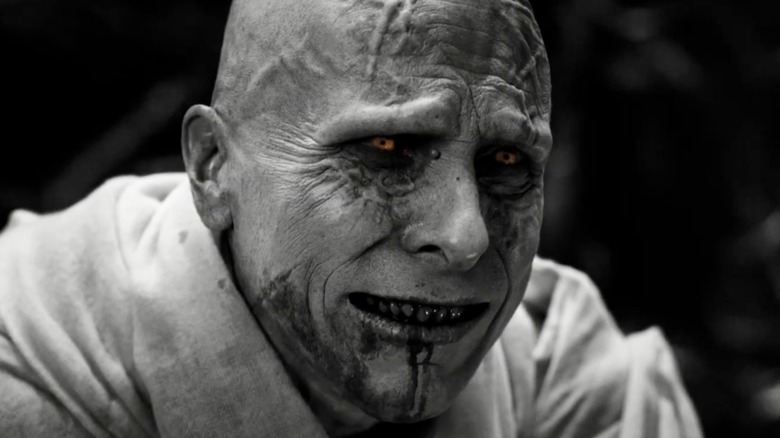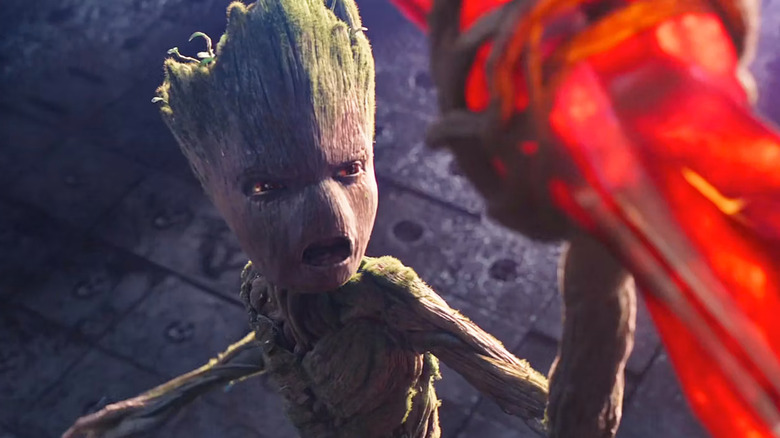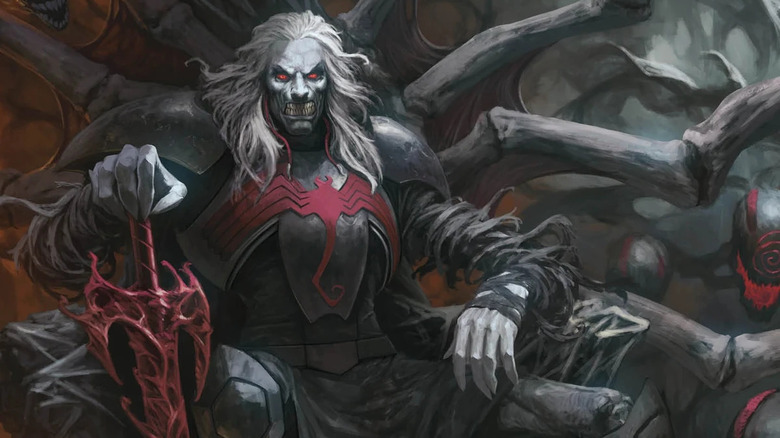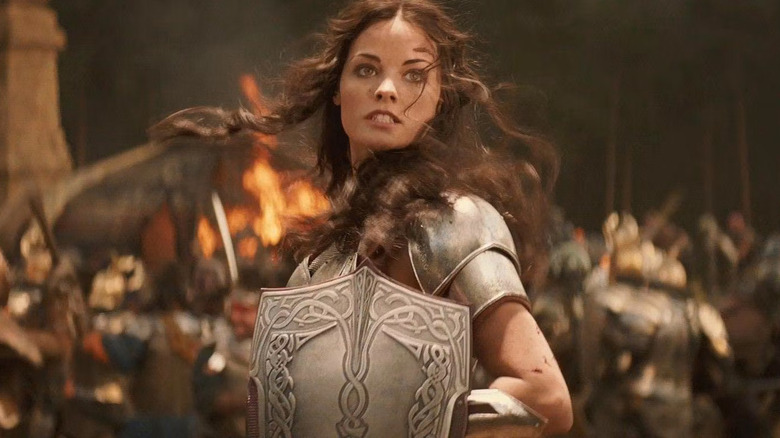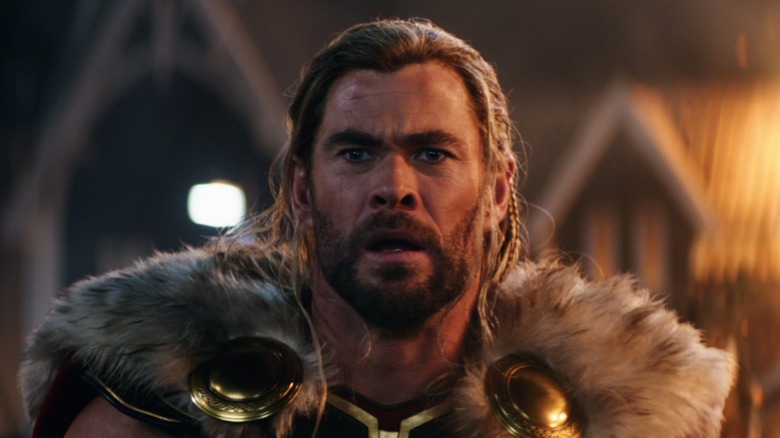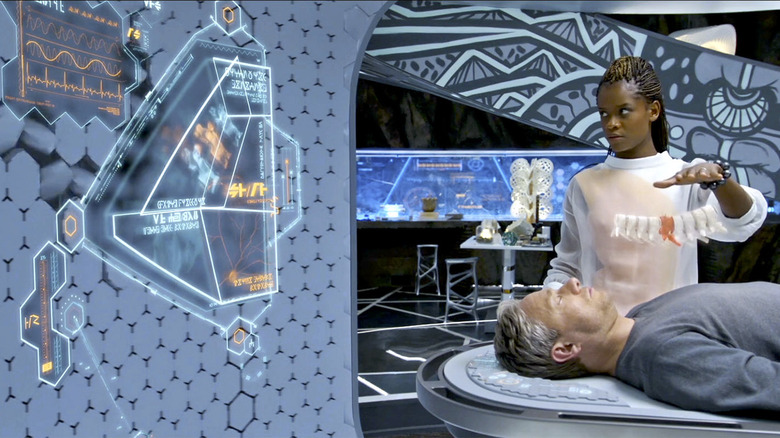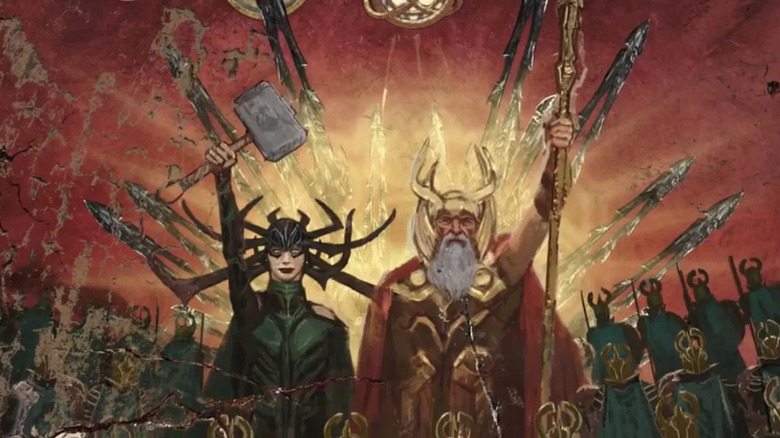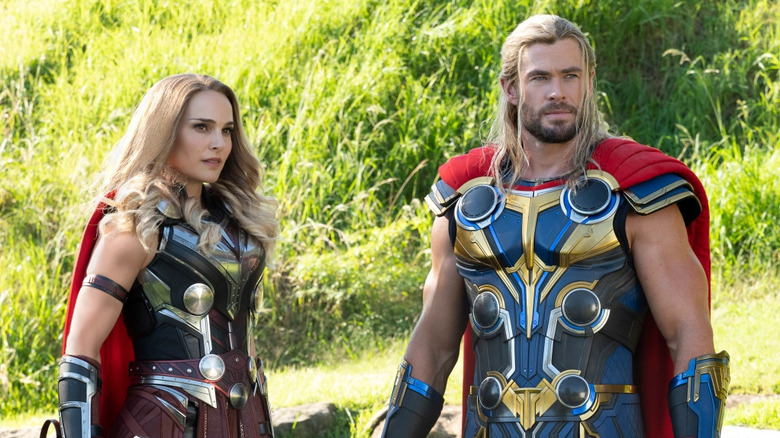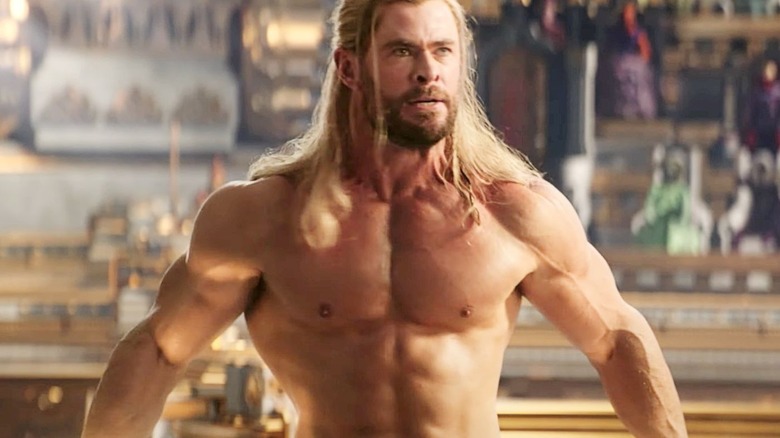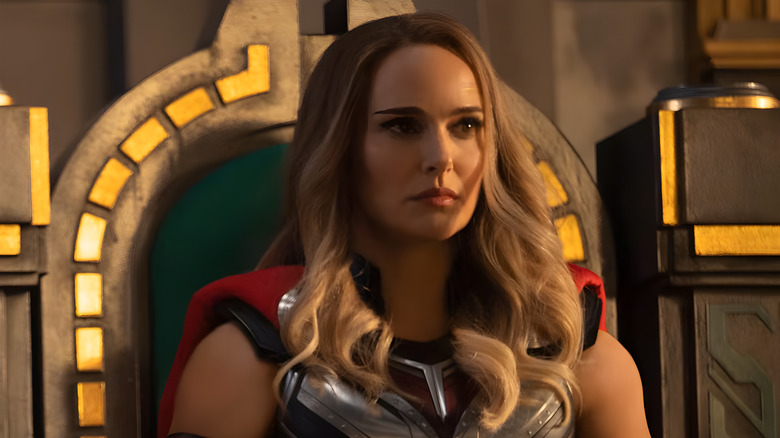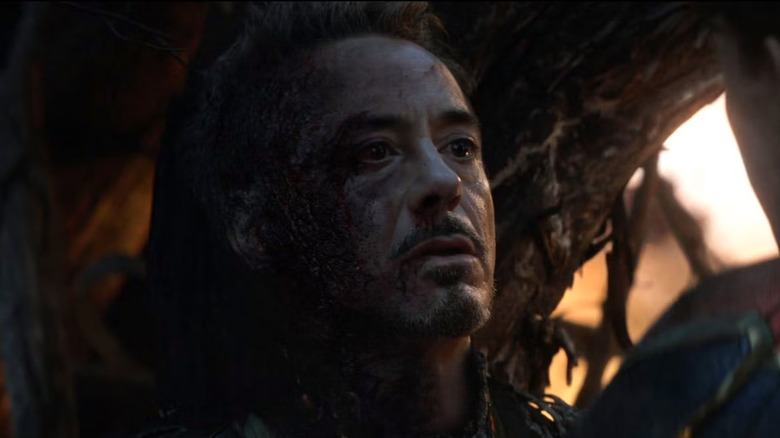Biggest Unanswered Questions In Thor: Love And Thunder
Whether you are a comic book diehard, a casual fan of the Marvel Cinematic Universe movies, or just in it for the chiseled god factor, "Thor: Love and Thunder" is a must-watch. For all the movie's inconsistencies and missed opportunities, the film spends almost every minute from start to finish delivering what fans wanted most: a fantastic and funny blend of righteous Space-Viking action and delightfully awkward, slapstick humor.
Ever since the introduction of director Taika Waititi to the franchise with "Thor: Ragnarok," Thor movies have become a singular entity — the only place to see the spectacle and humor on that level. No other movie series can deliver talking rock creatures, polyamorous Valkyries (Tessa Thompson), Zeus (Russell Crowe) planning his annual god bacchanalia, and a pair of maniacally screaming, indestructible goats — all in one, sub-two-hour package.
But a universe like Thor's, as vast and variable as it is, and with a limitless amount of possibilities, is guaranteed to come with a few confusing moments. Some, we can answer based on prior knowledge or a deeper insight into the context of the movie, but some are left woefully unanswered. For every gift that Waititi and company gave us, it seems they left us with another mystery, and we've gathered the greatest among them here. Let's take a look at all of the biggest unanswered questions in "Thor: Love and Thunder."
Is Stormbreaker a Groot?
Thor's (Chris Hemsworth) iconic weapon Mjolnir has always been something of a mystery. Was it ever truly sentient? How did it work, beyond the cop-out answer of "magic?" How could it actually gauge a wielder's worthiness, and does it psychically sense Thor's intentions when thrown? Similarly, everyone's favorite monosyllabic tree person, Groot, has always been a bit of an enigma. How can he regrow from a single twig? Does that mean that his consciousness is stored in every little sliver of his wood? If you cut him in half, do you end up with two Groots?
The reason we bring up these two mysteries together is that, as of "Infinity War," the two sets of questions now all apply to one item: Stormbreaker, the magic ax made from the arm of Groot. Stormbreaker has always been a bit of an unknown in the MCU, given that it seems to have all the powers of Mjolnir without the benefit of any of Odin's spells (that we know of). And "Thor: Love and Thunder" ramps up the weapon's power and mysterious nature tenfold. In the movie, the weapon demonstrates obvious sentience, and even a personality, by showing Thor its extreme jealousy when the God of Thunder attempts to summon his old pal Mjolnir. There may be an answer, one subtly revealed early in the film: When Thor plants Stormbreaker in the dirt, it grows roots. Just like Groot was reborn from a tiny, burnt little twig, it seems Stormbreaker may be attempting to regrow itself from its handle as well.
What about the Necrosword's origins?
In the Marvel comics, the origin of All-Black the Necrosword — the deadly, onyx weapon wielded by Gorr the God Butcher (Christian Bale) — is thoroughly explained. Between writers Jason Aaron and Donny Cates, the long history of the Necrosword, its true nature (as a living Symbiote), and its creator — the dark god Knull — have been fully fleshed out. But throughout the weapon's MCU debut in "Thor: Love and Thunder," the weapon is never explained satisfactorily.
It is evident from the fact that every god seems aware of and afraid of the Necrosword that the weapon's history is long and storied, but no portion of that story is ever revealed. When we first see the sword, it lays motionless next to the body of its former wielder, an unnamed, dead god. Beyond that, we never learn much about the sword, aside from its habit of slowly poisoning and maddening its wielder. That toxic nature of the instrument certainly could be due to the blade being itself a living Symbiote, as others of the species like Venom and Carnage have been known to slowly infect their wearer, but no conclusive answer is ever given. As of a post-credits scene in "Spider-Man: No Way Home," at least, the Venom symbiote does indeed exist in the MCU proper, so anything is possible.
Where was Sif?
Okay, yes, the real-world answer to the question of Sif's whereabouts since the events of "Thor: The Dark World" has an easy enough answer: The actor that portrays Sif, Jaime Alexander, was busy filming her hit NBC crime-drama series "Blindspot." But every Hollywood production is limited by availabilities, budget, and an endless amount of other constraints, and those films, especially if they're in a connected universe like the MCU, need an in-canon explanation as well. Lady Sif, former best friend and love interest for Thor was absent for nine years (aside from sporadic TV appearances), and according to "Thor: Love and Thunder," the Asgardian warrior was... out there. Somewhere. Fighting something. For some reason.
When we catch up with Sif via an interstellar distress signal in "Thor: Love and Thunder," she's in the midst of combat, fighting alongside some unnamed alien gods against Gorr, and losing badly. However, that small bit of information is where the statements end and the questions begin. Where was Sif all this time? Was she not on Asgard when it fell? If not, why? Why didn't she return to New Asgard to help her people rebuild their civilization? Who were the gods she fought with, and how did she know about Gorr well in advance of Thor and the Guardians of the Galaxy? Hopefully, a future female-led Asgardian movie will make up for sidelining Sif, as well as Valkyrie.
Why are Earth's gods in charge?
In the MCU, for some reason, it seems that Earth's gods are much more important to the cosmos and its many goings-on than any other planet's. Just like Sif's absence, there is a simple real-world explanation for this Earth bias: The people who make and watch the movies are all from Earth. And while that certainly explains why we watch movies about Thor and Hercules (soon) instead of movies about some random god from another random rock in space, "Thor: Love and Thunder" added a couple of remarkable details to the MCU that make Earth's central status a bit more baffling.
Firstly, Omnipotence City, the meeting place of all the universe's (or at least galaxy's; they are always a touch vague about that, too) many pantheons, is ruled over by Zeus, of the Earth-based Greek pantheon. Given that NASA estimates our galaxy to contain over 100 billion planets, the odds that a god from Earth would be in charge are, well, about one in 100 billion. Secondly, the film's second half centers around Gorr's attempts to reach the abstract cosmic entity known as Eternity, and for some reason, the Bifrost is the one key to getting there. For some reason, Earth's Norse Pantheon — and specifically its God of Thunder — contains the sole means of access to Eternity. Surely one of the other 100 billion planets has a more suitable pantheon and more suitable god, like say, a God of Keeping Eternity Safe and Hidden? Shrug.
What's the status on Earth's technology?
Earth's gods aren't the only beings whose status in the cosmic order is in question as of "Thor: Love and Thunder" — its regular humans' status is, too. When daily life in New Asgard is finally revealed in greater detail, we see that it employs its own police force, which is equipped with armor and weapons that look purposefully half-human and half-Asgardian. That suggests an intermingling of technology, just as their flying tour boats do.
Given the fact that at least some humans now have access to Asgardian technology in this story, and since the entire plot of "Black Panther" revolves around the hyper-advanced country finally sharing its technology with the rest of the world as well, we can only assume that the humans of the MCU are now centuries more advanced than we are. And there's another major asset that the MCU human have that we don't: Dr. Jane Foster (Natalie Portman).
When explaining her book and the research behind it, Foster reveals that she has essentially solved the physics behind Einstein-Rosen Bridges, aka wormholes. Given that many physicists believe that wormholes are based on laws from both General Relativity and Quantum Mechanics, Foster's findings heavily imply that she has at least partially cracked the Theory of Everything/Grand Unifying Theory. Even being conservative, Foster's theoretical advances, paired with newly-accessible Wakandan and Asgardian tech, means that the humans of Earth 616 have a bright future close at hand.
What happened to the Odinforce?
In both the Marvel comics and the MCU, the awesome, nigh-infinite power of Odin is named the Odinforce. It is one of the strongest and most versatile energy sources in the universe, making Odin more fearsome and formidable than nearly any other god, and even as much as some cosmic entities like Galactus (as evidenced in 2011's "Mighty Thor #5"). The Odinforce is what allows Odin to empower his spear Gungnir, the Destroyer, and even Thor's trusty Mjolnir, so it is clearly a force to be reckoned with. That's why its absence from the MCU after Odin's death is not only noticeable but begs the question: Wait, where did it go?
In the comics, the Odinforce is passed down from king to king — Bor wielded the Borforce and then passed it to Odin as the Odinforce, and he, in turn, passed it to Thor as the Thorforce. But the MCU never explains nor shows any such bequeathal, and that leads to two all-important questions. First, did Thor ever inherit that tremendous power? And if not, might instead the power have passed to Asgard's king, Valkyrie? In the past, the line of kings has always been genetic as well as political, but ever since the end of "Avengers: Endgame," when Thor made Valkyrie king, the two lines are separate, and so the MCU may very well have its own Thorforce, Valkyrieforce, both, or neither.
What are gods?
If there is one question that the Marvel movies of Phase 4 have repeatedly raised, it is: To what extent are humanity, power, and destiny all related? In "Spider-Man: No Way Home," we saw a human, Dr. Strange (Benedict Cumberbatch), tear apart the fabric of the multiverse. In "Doctor Strange in the Multiverse of Madness," we saw both Strange and another human, the Scarlet Witch (Elizabeth Olsen), do the same on an even larger scale. Then, in "Thor: Love and Thunder," we see another human, Foster, wield the weapon of a god, become a god herself, and fight toe-to-toe with gods — as did her antagonist, Gorr. And with the increasing number of uber-powerful beings populating the MCU that are not gods, like the Watcher, Celestials, and the Living Tribunal, the question of what exactly a god is has become more vexing than ever.
A particularly puzzling detail about the MCU's divine beings is that their continued existence and power don't seem to be connected to the one thing you would expect to be guaranteed: worship. When a desperate, broken Gorr comes across his own god and explains that all of his worshippers are dead, the god admits that he is happy to see them go — he doesn't need them, nor does he care about their existence. The gods of the MCU are clearly not determined by worship or by power — otherwise, the reality-rewriting Scarlet Witch would be one of their greatest.
What's the cosmic hierarchy here?
So far, we've covered the fact that MCU's humans are stronger than ever, both in the growing number of super-powered beings in their ranks and in the hyper-advanced technology they either have or will soon have. We've also covered the fact that the MCU's gods seem to merely be a loose assortment of powerful beings that aren't powerful enough to be considered abstract entities like Eternity or the Watcher. The obvious question, then, is what exactly does the cosmic hierarchy of the MCU look like?
Two Celestials attended Zeus's meeting of the gods, even though they aren't gods themselves. Every god and their uncle seems aware of Eternity, and so presumably, also its twin, Infinity. Do universal constants and abstract beings cohabitate freely with gods? We know gods do with people, so that implies a surprisingly open and tolerant universal community. Do the other universal constants that we haven't met, like Galactus and the Phoenix, act in a similarly casual manner? And we've met two Elders of the Universe so far — the Collector and the Grandmaster — so are they gods, abstract beings, or something else? Quite frankly, it's surprising that a universe so jam-packed with near-omnipotent super-beings of varying backgrounds hasn't yet destroyed itself.
How does Valhalla work exactly?
One of the biggest reveals in "Thor: Love and Thunder" is that Valhalla, the fabled resting place for deceased Asgardian gods, is real. Upon her death, Foster is welcomed there by Heimdall, who looks happy, healthy, and serene. Well, he wouldn't be if had all the same questions that we do upon watching that scene.
If Heimdall is in Valhalla, is Odin (Anthony Hopkins) there, too? What about Frigga (Rene Russo), Loki (Tom Hiddleston), Skurge (Karl Urban), and the Warriors Three? And if Foster is welcome there because she proved herself worthy and wielded Mjolnir in defense of Asgard, then surely everyone's favorite Mjolnir wielder, Captain America (Chris Evans), could end up there as well?
Perhaps more important than any of these questions is the matter of Valhalla's accessibility. For one thing, the very job definition of a Valkyrie is to freely travel between Valhalla and the other realms, so can King Valkyrie just pop in a visit Foster and Heimdall? Can she relay messages between them and the living? Can she bring them back? And if the answer to any of those questions is yes, then surely Hela (Cate Blanchett) could have done (or actually did) the same thing with the damned souls of Hel/Helheim.
Wait, is this heaven?
The confirmation of Valhalla's existence in the MCU carries with it even more questions than those regarding the Norse realms and their denizens. Alongside Valhalla, the MCU has already confirmed the existence of two other afterlives — the Ancestral Plane of the Wakandan people and the Duat of the Egyptian people. Unless Marvel plans to make the exceedingly bold claim that those three religions are the only three that got it right, then in general, we now know that afterlives exist — and seemingly, all of them.
Western audiences will be most concerned with the Christian versions of Heaven and Hell, the former of which will almost certainly welcome Steve Rogers, who was adamant in life that "there is only one god." But as we mentioned, Rogers did wield Mjolnir, so will he be given a choice between Valhalla and Heaven? On the darker side of things, if Hell exists, does the devil? It's worth noting that Hell is also a requirement for the (re)introduction of Ghost Rider, too.
Getting even darker than the concept of Hell, we have to wonder now how atheists fare in the mythos of the MCU? Tony Stark saved half the sentient life in the galaxy but died, apparently, as a non-believer. Will he spend an eternity of punishment in some Hell? Will he end up as nothing, nowhere, while his more devout fellow Avengers spend eternity in various paradises? As tricky as it would be to stick the landing on this existential conundrum, an answer from Marvel would be a major relief when it comes to the fate of some fan-favorite characters.
